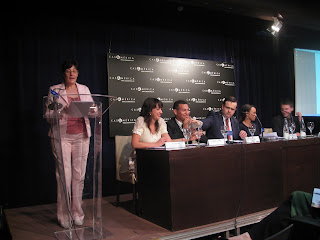With rave reviews from friends and colleagues, I am happy to report that our immigration conference, "De emigrante a inmigrante: el nuevo mundo de España. Siete perspectivas estadounidenses sobre la inmigración en España," which drew a standing room crowd, was an absolute success on every level. Allow to make a few points about the successful event.
First, our moderator, Oscar Perez de la Fuente, a professor of law and philosophy at my institute at the Universidad Carlos III, gave a strong introduction to the evening's proceedings, focusing on the manner that immigration demonstrates the contradictions in the evolution of a supposedly "flat," globalized system of countries and markets. For instance, the modern global economy, which is supposedly based on the free movement of capital, ideas, and people, creates open borders for capital, but creates walls for the free movement of immigrants seeking a new life in another country unless a government decides to open up its borders boost its number of cheap laborers or 'qualified' individuals to meet the demands of its labor market.
It was a strong introduction and I am happy to have worked with a brilliant and affable individual who has been a major supporter of our effort to put on this conference and an excellent partner in the development of the theoretical underpinnings of the links between our presentations and research projects.
On the issue of presentations, each individual researcher used their own style and medium to outline the findings of their work, which ranged from a study of the experiences of Colombian women who work as domestic workers in Madrid, the evolution of cultural traditions within public and private spaces in South American immigrant communities in Madrid, a documentary about the experiences of Sub-Saharan African men who live and work in Madrid.
Although I have discussed my presentation and work at length in several postings, I feel that my presentation was strong and communicated the findings of my research quite well. I could have added some detail on the manner that the Spanish Government could find ways to fully implement the spirit of the Tribunal Constitucional's sentences against the LO 8/2000 -- for instance, reforming the LO 14/2003, which forces immigrants to apply for their visas and work contracts from their country of origin or to wait three years without deportation to apply for residency in Spain -- but managed to include some more detail over these issues in the question and answer session that followed the presentations.
On the level of audience and audience participation, I was happy to see an excellent mix of immigrants and representatives from pro immigrant/immigrant managed NGOs who worked with us, academic and professional experts on the subject, and our individual friends as well as our Fulbright peers who came out to support us. Our moderator commented that it was refreshing to see so many different people from different walks of life stay for the whole conference (2.5 hours!) and participate in a lively discussion over the topic. Indeed, it was interesting to hear the audience's perspectives -- especially the perspectives from Spaniards themselves -- about our work and our views on immigration to Spain. Aside from being impressed by the breadth and depth of our work, the Spanish commentators felt that many Spaniards lacked interest in studying the impact of immigration on different economic, political, social, cultural, and legal Spanish institutions.
Although I am sure that our research may not impact the development of immigration research in Spanish academia, I feel that it is important to support research studying this issue to help develop a more comprehensive and accurate discussion about immigration in Spanish civil society. Given that the center right Partido Popular, which has legislated the LO 8/2000, won a greater majority of seats to represent Spain in the European Parliament in today's election, it is crucial that to find new means of social mobilizing and communication to counter xenophobic responses from right wing parties and push left wing parties to respect immigrant rights in Spain and Europe. Expanding education and research on this issue is an excellent first step in meeting this goal, one which will take and effort as the economic crisis continues to create an excellent cover for individuals to place blame on immigrants for a myriad of social troubles that emerge from wider structural issues in the evolution of the European welfare state in the post industrial age.
But that comes with time. In the meanwhile, the fact that seven individuals who decided to put on a conference manage to find support within host institutions such as the Universidad Carlos III and organizations like the Casa de América and the wider community to put on a successful event demonstrates the manner that an excellent idea coupled with a strong marketing scheme based on spreading the word through the internet and word of mouth can give people the opportunity to present their work, even in a foreign country.
More importantly, it demonstrates that we have grown into individuals who have strong ties to the communities in Madrid and Spain and have made efforts to invest in their well being as a way to thank them for their support in our work that we have carried out over the last year. It was truly an amazing evening and I am incredibly proud of what we have managed to accomplish in so little time. Now time to begin the last push to finish my work in Madrid...
If you want to see more photos from the event, please take a look at my colleague's website: http://www.peterholderness.com/esp/nocheca/index.html
Thursday, June 4, 2009
Subscribe to:
Post Comments (Atom)




No comments:
Post a Comment